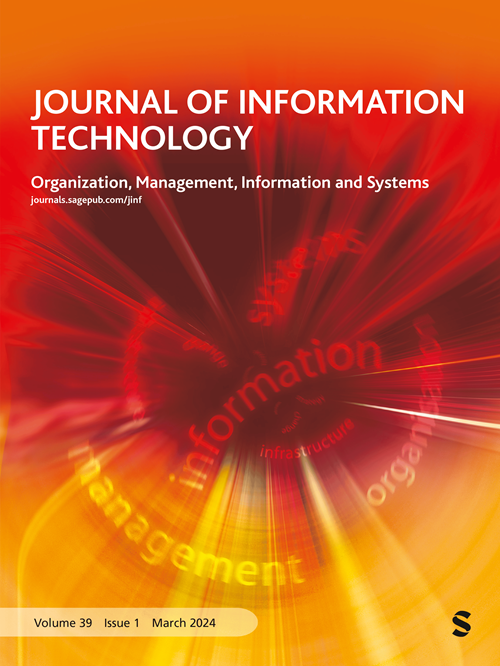Vendor capabilities development in blockchain sourcing: a parallel play approach
IF 5.4
3区 管理学
Q1 COMPUTER SCIENCE, INFORMATION SYSTEMS
引用次数: 0
Abstract
Vendor capabilities development has been an important research stream in the information systems (IS) sourcing literature. The existing research, which was based on the context of implementing centralized enterprise systems, focused on the adoption of deliberate learning and implicit learning, with the assumption that effective selection between these two learning approaches is sufficient for service providers to acquire vendor capabilities. However, this assumption may not hold in implementing a decentralized system based on enterprise blockchain. Because an enterprise blockchain system affords a new way of governing transactions and demands a new governance mode, it creates an uncertain and complex landscape in which the mere selection between deliberate learning and implicit learning becomes insufficient. Addressing this gap is crucial because many enterprise blockchain projects fail due to the incompetence of service providers. By conducting an in-depth case study of a successful blockchain service provider, our study reveals a new mechanism for developing vendor capabilities: parallel play. As with parallel play by preschoolers, the service provider combines a set of learning approaches featuring borrowing from peers and learning through experimentation. Our study extends the IS sourcing literature on vendor capabilities development from the context of implementing centralized enterprise systems to the context of implementing decentralized enterprise blockchain systems. Our findings also provide guidelines for blockchain service providers to follow when acquiring vendor capabilities and for clients to use when selecting service providers.区块链采购中的供应商能力开发:平行游戏法
供应商能力开发一直是信息系统(IS)采购文献中的一个重要研究方向。现有研究基于实施中心化企业系统的背景,重点关注采用刻意学习和隐性学习,并假设在这两种学习方法之间进行有效选择足以使服务提供商获得供应商能力。然而,在实施基于企业区块链的去中心化系统时,这一假设可能不成立。因为企业区块链系统提供了一种新的交易管理方式,并要求一种新的管理模式,这就造成了一种不确定的复杂局面,在这种局面下,仅仅在刻意学习和隐性学习之间进行选择是不够的。解决这一差距至关重要,因为许多企业区块链项目都因服务提供商的无能而失败。通过对一家成功的区块链服务提供商进行深入案例研究,我们的研究揭示了一种开发供应商能力的新机制:平行游戏。与学龄前儿童的平行游戏一样,该服务提供商结合了一系列学习方法,包括向同行借鉴和通过实验学习。我们的研究将有关供应商能力开发的 IS 采购文献从实施集中式企业系统的背景扩展到实施去中心化企业区块链系统的背景。我们的研究结果还为区块链服务提供商在获取供应商能力时应遵循的准则以及客户在选择服务提供商时应使用的准则提供了参考。
本文章由计算机程序翻译,如有差异,请以英文原文为准。
求助全文
约1分钟内获得全文
求助全文
来源期刊

Journal of Information Technology
工程技术-计算机:信息系统
CiteScore
10.00
自引率
1.80%
发文量
19
审稿时长
>12 weeks
期刊介绍:
The aim of the Journal of Information Technology (JIT) is to provide academically robust papers, research, critical reviews and opinions on the organisational, social and management issues associated with significant information-based technologies. It is designed to be read by academics, scholars, advanced students, reflective practitioners, and those seeking an update on current experience and future prospects in relation to contemporary information and communications technology themes.
JIT focuses on new research addressing technology and the management of IT, including strategy, change, infrastructure, human resources, sourcing, system development and implementation, communications, technology developments, technology futures, national policies and standards. It also publishes articles that advance our understanding and application of research approaches and methods.
 求助内容:
求助内容: 应助结果提醒方式:
应助结果提醒方式:


